If you’re among the many people suffering from discomfort or pain in your heels, you’re not alone. Heel pain is a common condition caused by diverse conditions, including plantar fasciitis, heel spurs and Achilles tendinitis. Discover the causes and the most effective heel pain remedies available, from stretching and physical therapy for plantar fasciitis to Shockwave Therapy for Achilles tendinitis and heel spurs. Whether you’re an athlete looking to get back in the game or want to walk without pain, we’re here to help you understand your options and make informed decisions about your care.
Taking a Closer Look into the Causes of Heel Pain
Heel pain is a common foot and ankle complaint resulting from various factors, including inflammation, bone changes, and nerve compression. The most common causes of heel pain are plantar fasciitis, Achilles tendinitis, and Sever’s Disease. These conditions are related to different factors such as physical activity levels, age, and mechanical foot function, and can all lead to significant discomfort in the heel area.
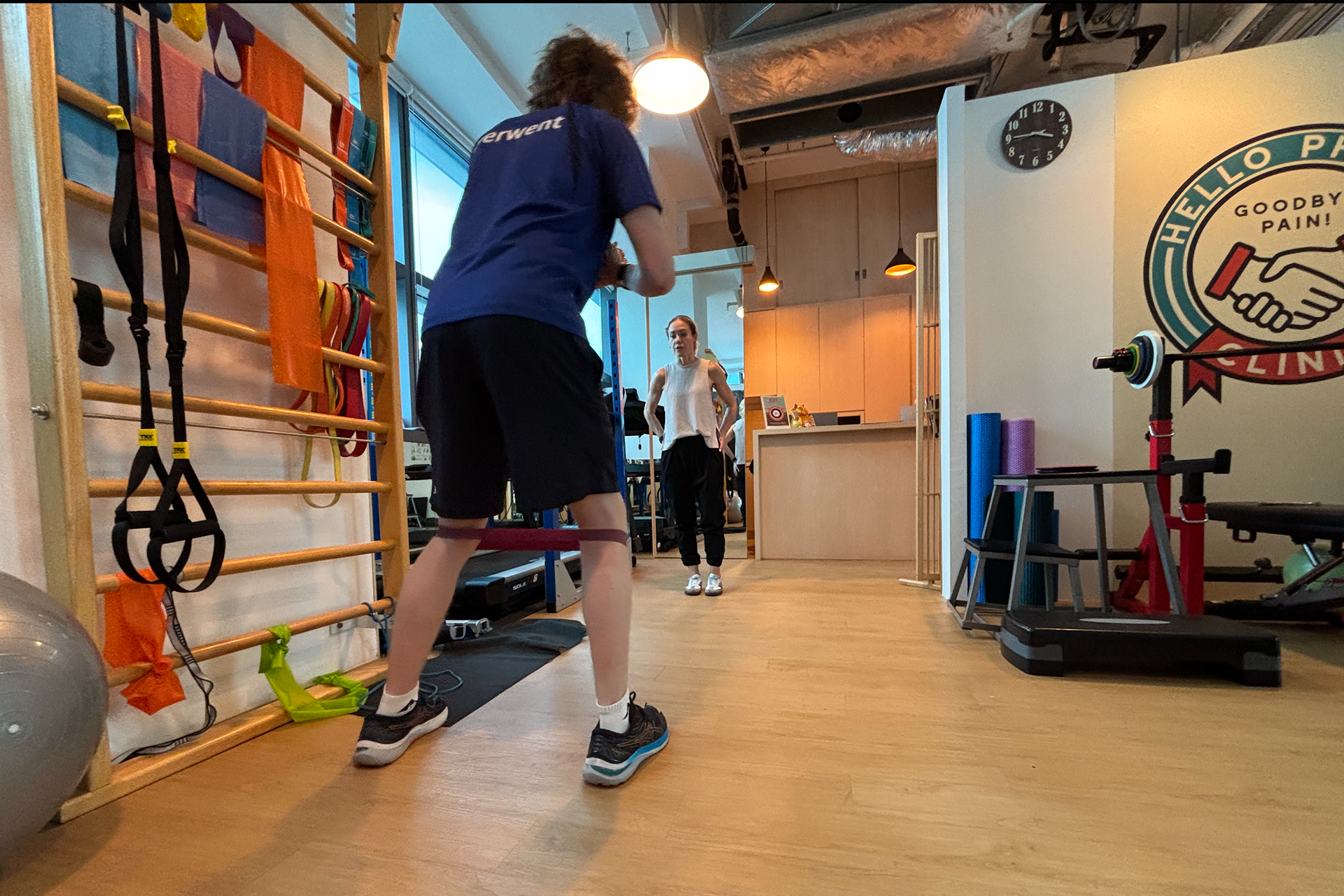
- Plantar fasciitis occurs when the plantar fascia, a strong ligament that runs from the heel bone to the tip of the foot, becomes inflamed due to excessive pressure or tears
- Achilles tendinitis is the inflammation of the large tendon in the back of the heel, usually caused by overuse or injury
- Sever’s Disease is the most common cause of heel pain in children and young adults, resulting from overuse and repetitive microtrauma of the growth plates of the heel bone
Other causes of heel pain include stress fractures, bone cysts, soft tissue mass, systemic arthritis, bone bruise, circulation problems, and poor posture when walking or running.
Most Effective Treatments for Heel Pain
Heel pain can be effectively treated with physiotherapy treatments, including Shockwave Therapy, manual therapy, dry needling, sports massage and stretching exercises to improve tight muscles.
Shockwave Therapy uses sound waves to aid the heel’s natural healing process by generating new blood vessels and increasing blood flow to the region. Manual therapy involves hands-on techniques such as deep friction massage and mobilization to reduce heel pain. Dry needling, similar to acupuncture, is a modern clinical technique where a very thin needle penetrates the heel’s skin and soft tissue, causing tissue remodeling in and around the needling site, relieving pain.
Stretching exercises can help stretch nerves and soft tissues to improve tight muscles and prevent the risk of injury. Additionally, strengthening exercises are important to prevent re-injury after heel treatment. Education regarding proper footwear and support is also crucial in preventing heel pain.
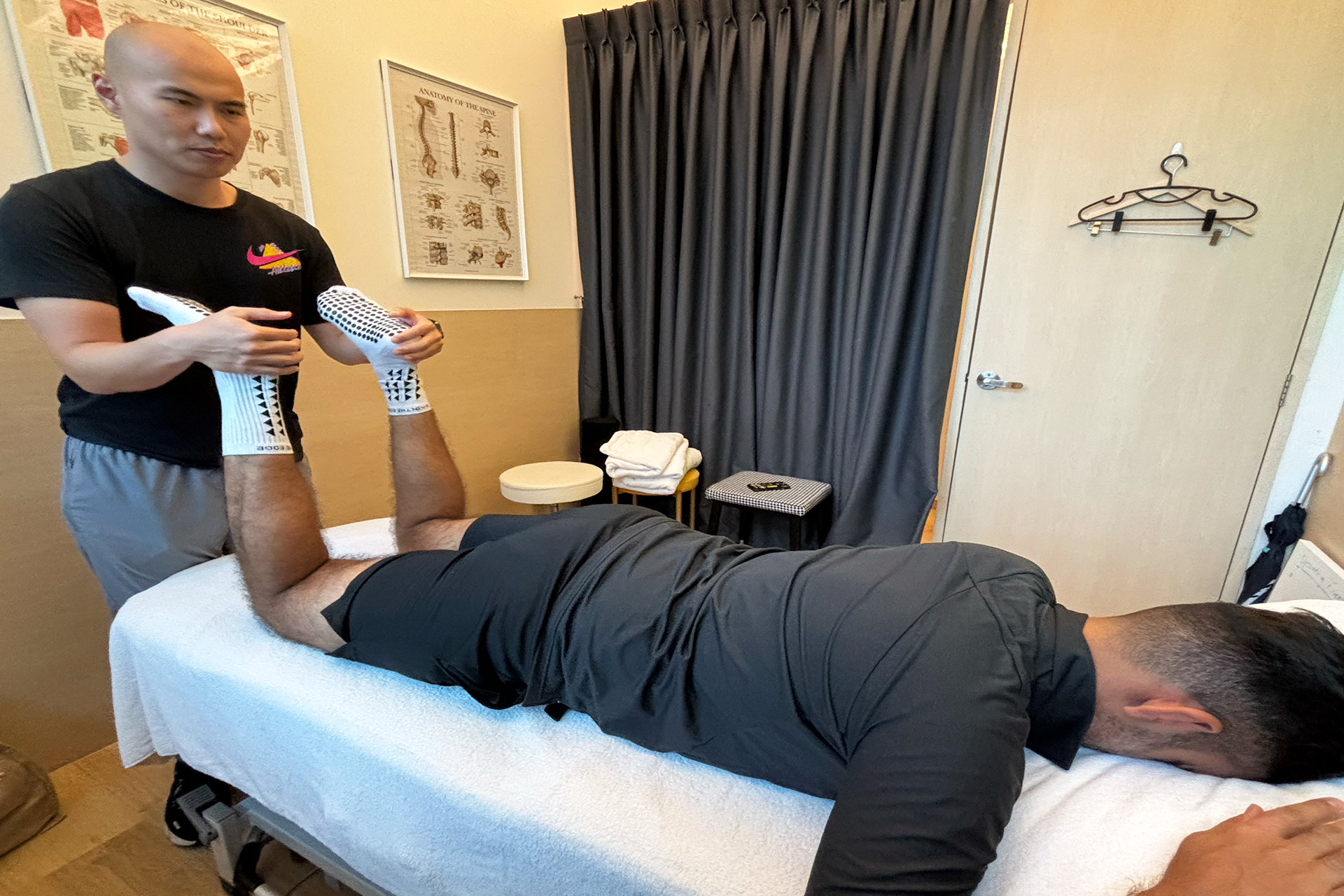
We offer some of the leading treatments at HelloPhysio and how they benefit specific conditions.
How to Treat Plantar Fasciitis Heel Pain with Shockwave and Manual Therapies
Shockwave Therapy is a highly effective treatment modality for plantar fasciitis, with significant evidence from large randomised trials supporting its use. The therapy involves the application of shockwaves to the enthesis of the plantar fascia at the inferior calcaneus, which is safe and effective in reducing pain and improving function. It can also treat heel pain with manual therapy, such as deep friction massage and mobilization.
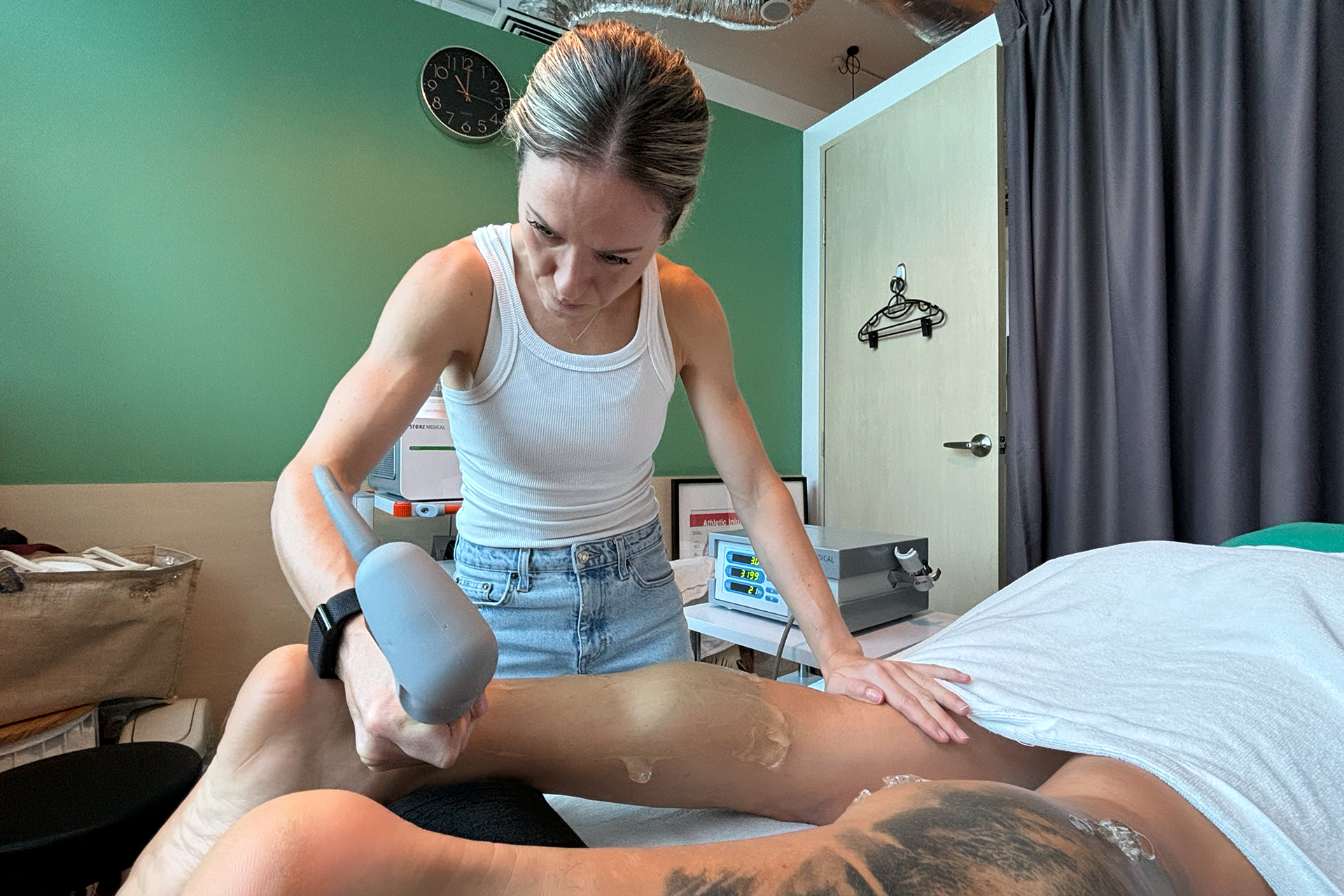
Plantar fasciitis can be a chronic and difficult condition to treat, but early diagnosis and commencement of effective treatment are key to a full recovery. Between 3 to 5 Shockwave sessions are typically required for significant resolution of plantar fasciitis pain. An ultrasound scan is unnecessary to diagnose plantar fasciitis, as a physiotherapist can accurately and reliably diagnose the condition at the first session.
How to Reduce Heel Pain with INDIBA and Shockwave Therapy for Achilles Tendinitis
INDIBA® and Shockwave Therapy are two treatments that can be effective for Achilles tendinitis. Shockwave Therapy uses acoustic waves to stimulate healing in the affected tissue. The sound waves can increase blood flow to the area, which can help to reduce inflammation and promote healing. Also, shockwaves can stimulate collagen production, a protein important for tissue repair.
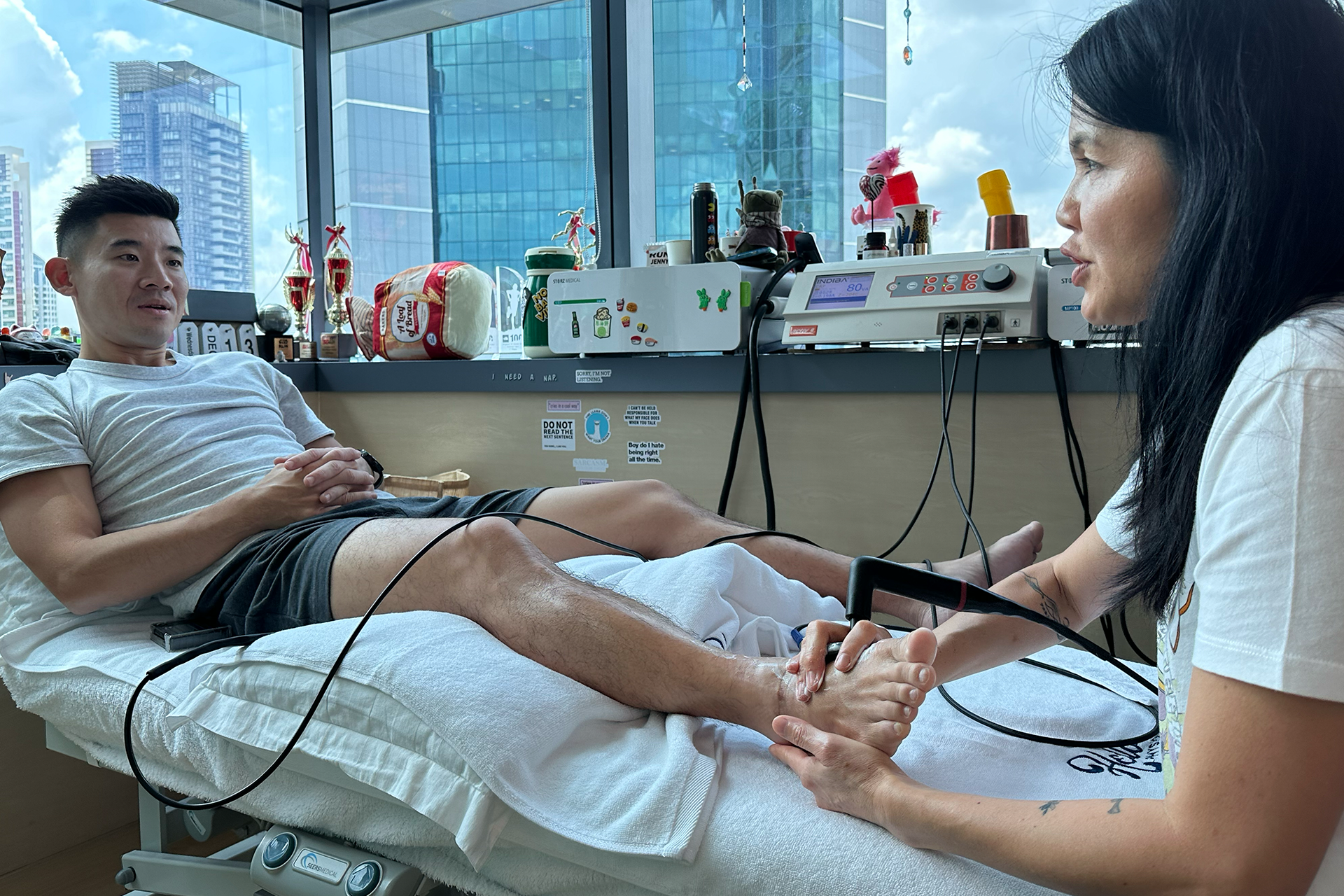
INDIBA® is a type of therapy that uses radiofrequency waves to promote healing. The radiofrequency waves can increase the temperature of the affected tissue, which can help to reduce pain and inflammation. Additionally, radiofrequency waves can stimulate the production of growth factors, which are proteins that are important for tissue repair and regeneration.
Shockwave Therapy and INDIBA® can be part of a comprehensive treatment plan for Achilles tendinitis, including rest, ice, compression, elevation, and physical therapy.
How to Heal Sever’s Disease Heel Pain with Clinical Pilates and Prescribed Exercises
Physical therapy and kinesiotherapy are two of the conservative therapeutic options for Sever’s Disease. Clinical Pilates, which focuses on core strength and flexibility, can also be beneficial. These interventions can help to reduce pain and inflammation, improve range of motion and flexibility and promote proper healing of the affected tissue. Educating parents and coaches on the symptomatology and presentation of Sever’s Disease is also important for establishing efficient preventive interventions and earlier diagnoses. This can include teaching about proper stretching and warm-up techniques and encouraging them to limit the high-impact activities their child or athlete engages in.
Book an Appointment
Physiotherapy for Chronic Heel Pain
Chronic heel pain can stem from various factors, including Achilles injury, calcaneal stress fracture, heel pad syndrome, bursitis, and plantar fasciitis, with the latter being the most prevalent. This condition specifically involves damage to the plantar fascia.
Shockwave Therapy is a highly effective rememdy for chronic heel pain, promoting new blood vessel formation, stimulating local collagen production, reversing chronic inflammation, and dissolving calcium deposits. It interrupts pain signals to the brain, providing immediate relief by lowering substance P levels, the neurotransmitter which affects pain perception, contracts the smooth muscle, dilates blood vessels and supports cell growth and wound healing.
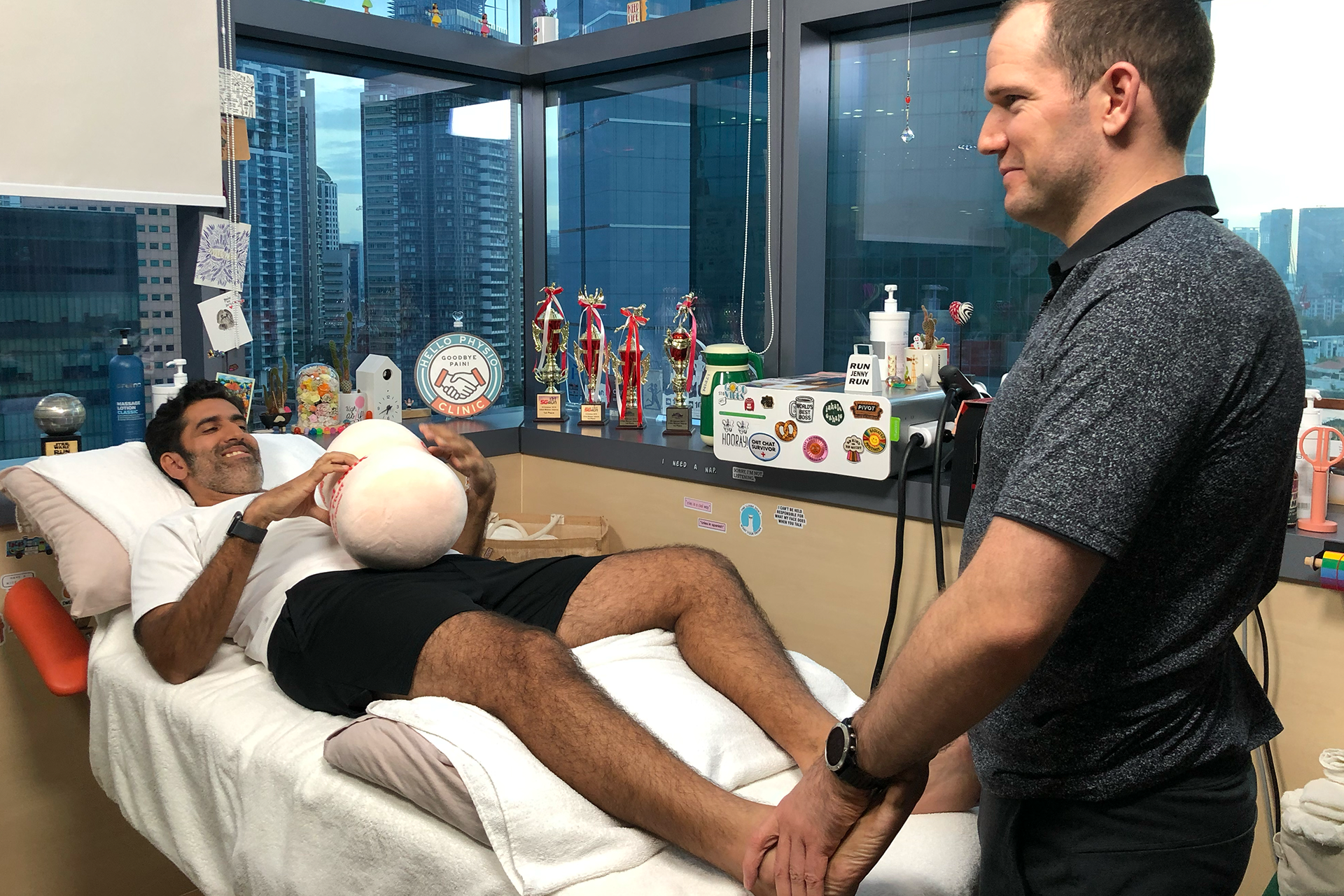
INDIBA® radiofrequency therapy enhances this heel pain remedy by increasing blood perfusion and the concentration of oxygen and nutrients in the affected area. It achieves this through a thermal effect that stimulates tissue repair noninvasively. This process improves metabolic reactions and facilitates an inflammatory response essential for the body’s natural recovery mechanisms. The physical, hands-on modality of the therapy enhances deep blood flow and nutrient uptake to the injured tissues.
Red Light Therapy, also known as LED Red Light Therapy, accelerates tissue healing and reduces inflammation and pain in injured areas, including those suffering from chronic heel pain. The therapy penetrates deep into the tissues at a cellular level, impacting the complete system of targeted muscles, tendons, ligaments, connective tissue, bone, nerve, and skin. This comprehensive approach addresses the root causes of chronic heel pain and aids in the recovery process.
Ready to take the first step towards a pain-free life? Contact HelloPhysio today to discover how our specialized physiotherapy treatments can alleviate chronic heel pain and get you back on your feet, moving comfortably and confidently.

